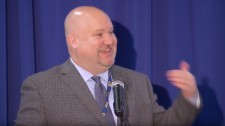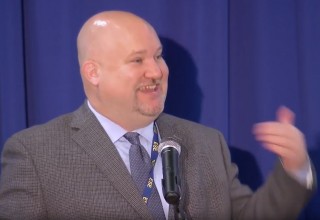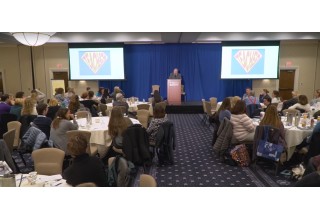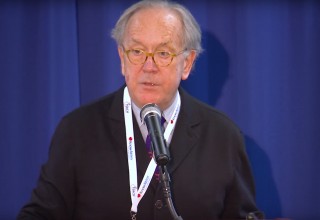Leaders Agree: Forget Memorization When It Comes to the Value of School

SALEM, Mass., November 19, 2018 (Newswire.com) - Engaging students in meaningful tasks and pedagogy needs to take center stage within classrooms, Massachusetts Education Commissioner Jeffrey Riley told a conference of close to 300 K-8 educators earlier this month, hosted by KnowAtom.
"The era of Ed. reform is over," Commissioner Riley said. "We need to close the chapter and figure out what's next. We've spent a lot of time on systems and structures, on accountability and test scores. We need to get back to focusing on instruction and deep teaching and learning."
The era of Ed. reform is over. We need to close the chapter and figure out what's next. We've spent a lot of time on systems and structures, on accountability and test scores. We need to get back to focusing on instruction and deep teaching and learning.
Jeffrey Riley, Massachusetts Education Commissioner
Riley spoke at the 2nd Annual TEACH Conference, held in Lowell, Massachusetts, on Tuesday, Nov. 6, where educators gathered to refine their vision of effective science instruction and explore how to teach the way that children learn.
"We are losing children throughout this commonwealth because we are not engaging them in deep tasks and pedagogy," Commissioner Riley continued. "Children we know learn through play, and yet we beat that out of them by the time they're in 2nd grade and make them sit in rows and fold their hands."
The answer, Riley said, is hands-on learning: working in groups, working collaboratively with a detailed task that is aligned to the standards and is engaging the students' minds.
This is supported by neuroscience research, according to Dr. Richard Elmore, who gave the keynote address at the conference. This is because the context in which people learn is critical to the ways in which the human brain operates. And the brain doesn't learn best through fact memorization.
"There's no such thing as facts in the brain," Dr. Elmore said. "Everything comes in — stimuli and information come in — in a particular context. That's what goes into storage. Not the fact, but the fact in the context of the experience in which the fact was encountered."
Because of this, asking students to memorize and recall facts isn't developing their learning capacity. A fact memorization approach to science K-12 is counter to the brain's very functioning.
This is a problem, Elmore said, because his research showed that between 70 percent and 75 percent of all tasks given to students in U.S. classrooms are memory tasks.
"We're judging [students'] fluency as learners based on their ability to recall without regard for the context in which it was transmitted," he said.
However, Elmore pointed out, the research isn't saying memory isn't unimportant as a metric of learning. Instead, memory needs to come in later, after children have developed other factors: executive function, control, conscious construction of their autobiography as learners, and agency in the world, the ability to engage in action and self-evaluate.
"Once those things are under control, memory can be a powerful source of learning," Elmore said.
This is particularly relevant for educators, schools and districts that are implementing the Next Generation Science Standards, which require that students demonstrate their thinking in order to achieve mastery.
These new standards are creating opportunities for teaching and learning in the classroom in ways that better reflect how learning and understanding happen in the brain.
"Teaching's not about the quick and easy answer," said KnowAtom founder and CEO Francis Vigeant. "It's about engaging students, developing and refining frameworks of knowledge and leaving them with a skillset that's going to be useful for the rest of their lives, not just some standardized test that comes and goes."
About TEACH: TEACH is a one-day conference dedicated to K-8 science teaching techniques, where any K-8 teacher can be inspired to refine their vision of effective science instruction and become more empowered to teach all students to mastery of the Next Generation Science Standards. This conference is a peer-to-peer exchange of knowledge that skips the well-trodden "easy answers." Attendees are on a quest to learn the nuances of expert teaching, the kind of practices that aren't intuitive but result in transformative student learning results.
About KnowAtom: KnowAtom makes real science possible in every K-8 classroom. We provide a complete K-8 solution designed for mastery of the Next Generation Science Standards: fully aligned curriculum, integrated hands-on materials and targeted professional development. Our research-based, classroom-tested tools and techniques bring students' own ideas to life with hands-on materials and technology.
To learn more, visit www.knowatom.com or call 617-475-3475.
Media Contact:
Sara Goodman
617-475-3475 ext. 2005
sgoodman@knowatom.com
Source: KnowAtom



